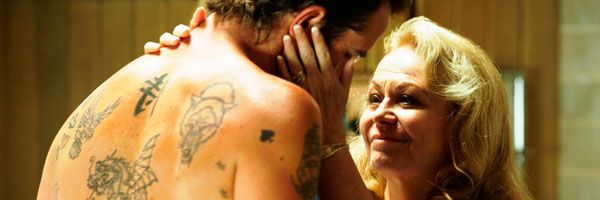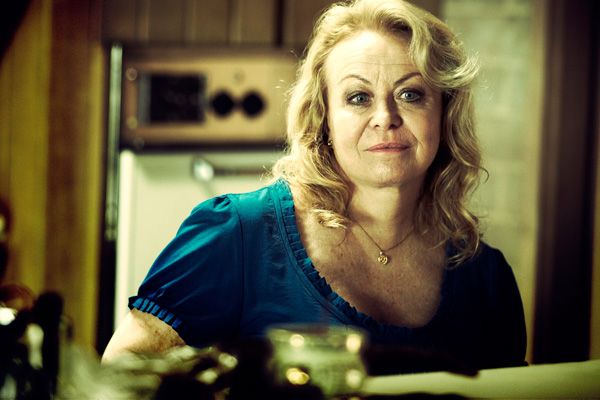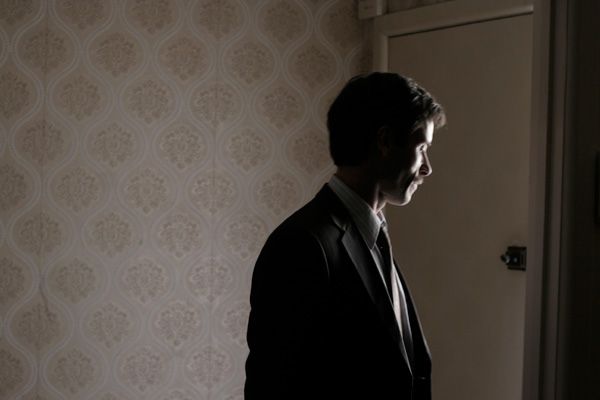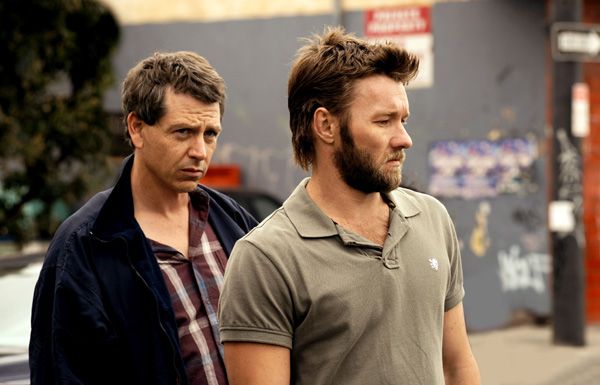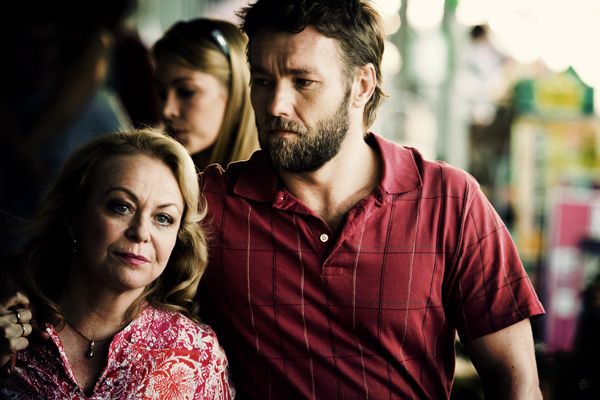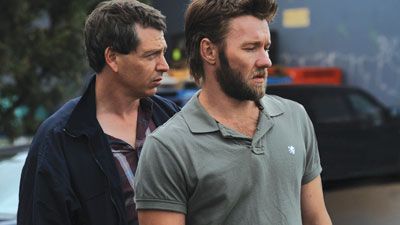Animal Kingdom features an outstanding ensemble cast portraying characters that run the gamut of the moral compass from Australian acting icon, Jacki Weaver, who plays Smurf, the deceptively sunny matriarch of the family, to international screen star, Guy Pearce, who plays an honest detective seeking justice for a cold blooded murder, to 17-year-old James Frecheville making his big screen debut as “J,” the naïve young nephew who moves in with his estranged family and finds himself in a world that is far larger and more menacing than he could ever imagine.
We sat down with Jacki recently at a roundtable interview to talk about her villainous performance in Animal Kingdom. A highly respected stage and screen actor with a slew of industry awards, she has been at the forefront of the Australian entertainment industry for over four decades, both on screen and on stage, and has starred in many seminal Australian films including Picnic at Hanging Rock. Jacki talked to us about why the moral ambiguity of her character makes it such an interesting story, what it was like working with David Michod, and how she kept it real, shifting effortlessly between normal, sweet and lovable one moment to monstrously cold and callous the next.
Q: I love your character. It’s an amazing performance. You make us think Smurf is a sweet grandmother to start off with and then we discover there’s a darker side.
JW: Thank you. I think that’s where David (Michod’s) writing is so good because the temptation would have been for me to jump in and make her a villain from the beginning which wouldn’t be half as interesting a story. I think that’s part of the interest that you find out gradually just how bad she is. It’s the banality of evil. She seems ordinary and sweet and just loves her sons and then she starts kissing them on the mouth. (Laughs)
Q: That first kiss with the son is a little bit unnerving and makes you think something is going on here. Can you talk about how she’s such a powerful character?
JW: I’m starting to sound like I know what I’m talking about like a clinical psychologist. I did talk to a couple of my friends who are and she does fit the bill as far as being a sociopath goes. It’s that total lack of a conscience, totally self-centered, callous, pragmatic, and doesn’t care who she hurts to get what she wants. She has no moral compass whatsoever and she’s obviously condoned the criminal behavior of these boys of hers all their lives. She loves them in her own way but, as we see, it’s inappropriate. And she’s had these boys by four different criminals who were all violent men themselves. So she fulfills her need for an intimate adult relationship [through her sons]. I’m not suggesting there’s incest -- I don’t think that’s part of the story – but the intimacy with the boys and kissing them on the mouth, that’s a gesture that was just a minor thing but I think it spoke volumes about the family. It was David’s idea too. It didn’t even occur to me. I have to admit it was a directorial choice. I wish it had been my idea.
Q: Do you think she’s really a mob boss behind the scenes pulling the strings?
JW: Well I think so. Yes. I think obviously she’s known about these armed bank robberies and drug dealing all the time and totally condoned it and been happy to live off the proceeds. That’s probably what she is. There is a woman in Melbourne. We don’t talk about her back in Australia because she’s still alive and she’s pretty dangerous. She had 6 or 7 sons. She’s like Ma Barker. There are a few of those dangerous matriarchs in the criminal underworld in Australia and this particular one is pretty scary. She did run protection rackets and brothels and drugs. She’s only got one eye because one of the rival drug dealers shot it out and her sons did kill two young cops in cold blood as a reprisal for a killing. So when David said “I want to make a film that’s got that incident in it,” I said “Ohhh!” and he said “But I want to make it fiction because I want more freedom to tell the story and I don’t want it to be a biopic of this woman. I want it to be our own story and invent our own character.” That was fine with me, especially because I would have had to wear a prosthetic eye. (Laughs) Apparently she was on talk back radio last weekend in Australia and she said “Everybody’s making fuckin’ money out of my fuckin’ life except fuckin’ me!” So we don’t talk about her. The libel laws in Australia are a lot tougher than they are in America so we haven’t been saying anything about her for fear of getting sued or shot. (Laughs)
Q: So you’ll be keeping a low profile when you return to Australia?
JW: Yeah. And we keep saying “This is a piece of fiction. It’s completely fiction.” Everybody knows it’s based on the Walsh Street murders.
Q: What was the challenge as an actor trying to balance that sweet mother again her real nature and who we find out she really is?
JW: I think in real life those kind of people do try to hide their true nature. It’s not obvious. That’s the nature of sociopaths. Part of the thing is that they conceal how bad and how lacking in any kind of decency they are. We see it in these sort of people. I like the way the film doesn’t glorify it though. I think it’s truthful and it makes you realize they’re ordinary people. I mean, I wouldn’t have minded making it a cops and robbers fun romp. There’s several ways you could approach that story. There’s the temptation to jump in and make her a wicked witch right from the start which would have been a nice camp crime story. But it’s a serious film. I like the fact that it looks at these people really seriously. It doesn’t make them fun figures – not that there’s anything wrong with that either.
Q: She’s demonized a little bit but at the end there’s some sympathy for her. You develop this kind of relationship with all of them. You see them as normal people.
JW: Well I think that’s good for us as an audience because part of it too is I think we’re all capable of bad things but luckily most of us are able to curb ourselves. I think that’s why we’re always so fascinated with criminal stories because there but for the grace of God it could be us.
Q: When you play a complex character like that, does you theater background help you with your character arc?
JW: Well it probably does because you have a lot more time to work out all the choices available to you in the theater. I’m rehearsing a play at the moment and we’ve got 5 weeks rehearsal. It’s 9 to 5, 6 days a week. That’s 6 [weeks] actually. (Laughs) You’ve got time to examine all the different ways of approaching the character and you’ve got time to do your research and read up on whatever their profession is and what their psychological make-up might be. But I think film actors do that too. We had the luxury of two weeks rehearsal before this film which, as you probably know, is quite unusual. That was quite valuable for the young boy, James (Frecheville), because he hadn’t had much experience at all before. In fact, none. But he brought fantastic poise and confidence and he was very conscientious. He had a lot of detail in his performance for one so young. I think he’s instinctively very good.
Q: I was wondering about the story. Did you talk about your character’s husband? Did you develop that past as part of the back story?
JW: That was our own sort of back story. We figured they all had different fathers including the mother who dies from heroin. At one point the boy says “I remember when Grandpa Donnie died,” and we figured that would be the father of the daughter. David was very open-minded about the back stories. We’d developed them all with him. And they’re only for us. The audience doesn’t have to know.
Q: What do you think your character’s relationship with her daughter was like? She doesn’t seem sad at all when she learns of her death.
JW: I know. I think it was probably really bad. That’s another thing of David’s. I said to him “I’d be crying on the phone, wouldn’t I, if I lost her?” He said, “No, I don’t think you would. You’ve made no attempt to see her in 17 years. You don’t like her. You probably saw her presence as an intrusion, not wanting another woman around, wanting just the boys and the men there.”
Q: Do you think she had a relationship with the boy before that time?
JW: The boy said something in the narration at the beginning that his mother had kept him away from the family and I would think that the daughter probably thought the only chance for this kid of mine is if I keep him away from my brothers and my mother. She probably realized from a very early age just the kind of power the mother had over those boys.
Q: When “J” hesitantly calls to ask you to pick him up, it’s as if he’s not really sure. That’s an interesting dynamic.
JW: Yeah, he doesn’t have a dad. He hasn’t got a chance really. When I’m in the audience, what I love about good storytelling is when they don’t tie up the ends. You have to invent it for yourself. And there are a million possibilities, especially with the ending. A lot of people want to know what happens at the end. David always says, “What do you think happens?” and he’s always interested in all the different ideas. I think probably the boy is top dog now. He’s the lion. She doesn’t embrace him wholeheartedly at the end but I think she’s going to have to be pragmatic and still be the top lioness but now he’s the lion.
Q: Do you think he would have stayed in the life?
JW: I think he hasn’t got a chance now. He’s committed a murder. He won’t go up for it because they can claim self defense. The police will be glad to be rid of Pope anyway because he was such an ass. So I don’t think he’s got any choice now. I think he’ll be a career criminal or at least stay with that dreadful granny. (Laughs)
Q: What was it like working with David?
JW: He’s fabulous. He’s really fantastic. Even though he’s a first time director, he’s a born collaborator. He doesn’t shilly shally either. He’s got a very clear vision of what he wants. But if you’ve got another idea, he will listen and sometimes incorporate what you suggested and sometimes not, which is the ideal way to go because some young directors are just so rigid about what they want. They treat you like a puppet. It’s a puppeteer thing. They just want you to do what’s on their storyboards. You might as well do an animatic film if you’re going to [do that], not that there’s anything wrong with animatic films. I was surprised when we saw it the first time in America. That was at Sundance. Everyone said they understood everything we said. That’s pretty good. The first time I came to America in the 70s, nobody understood a word we said then. That was before Russell Crowe.
Q: What’s the film industry like today in Australia?
JW: Well I work in the theater all the time. I’m the last sort of authority. I’ve done some small things in a couple movies in the last year or two but I haven’t really had a major role in film for about 12 years. But I never stopped working in the theater. I do stuff back to back. I’m in the middle of rehearsing a play at the moment and I’m doing 4 plays this year including one at the end of the year with Cate Blanchett at the Sydney Theatre Company. It’s Chekhov’s Uncle Vanya.
Q: What are you rehearsing right now?
JW: It’s an old British black comedy, an old classic from the ‘60s by Joe Orton called Entertaining Mr. Sloane. A very bad film was made of it but it’s a much better play. It’s kind of sordid and disgusting but very, very funny. My husband and I are playing the brother and sister who are both having an affair with the same young man. (Laughs) We cannot stop laughing. It’s so absurd. I saw it when I was still at school when it first came out in the ‘60s and I was really shocked. My parents took me. I don’t think they knew just how shocking it was going to be. But it’s still shocking and we’ll have old ladies walking out I’m sure which is good. It’s one of the functions of the theater to shock and titillate and appall, apart from entertain and delight.
Q: When you came to the States in the ‘60s, did you try to get work here?
JW: No, you see, my generation didn’t do that, whereas nowadays a lot of them come over here, especially during the pilot season. But it was never on our agenda. Some of them did. We were totally imbued with American culture and British culture. I keep saying my son grew up watching Sesame Street and I grew up watching Mickey Mouse Club. Annette Funicello was my favorite Mouseketeer. I came here in ‘72 simply because I’d worked in the theater professionally since I was a kid and I wanted to start seeing Broadway shows. I also had this romantic idea about the Algonquin Hotel and Dorothy Parker and Itzhak Perlman so I stayed at the Algonquin. In those days, people would say “Where are you from?” and you’d say “Australia” and they’d say “You speak English so well.” (Laughs) I play a lot of Americans. I do a lot of American plays. I’ve done a lot of Arthur Miller, Tennessee Williams and Neil Simon. I was in Sisters Rosensweig, Six Degrees of Separation, all of that stuff. So we’re very familiar with America. I did 400 performances of Born Yesterday. I did 700 performances of They’re Playing Our Song. So yeah, I’m as American as you are almost.
Animal Kingdom opens in theaters in New York and Los Angeles on August 13th.

